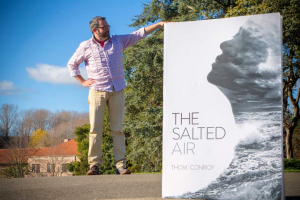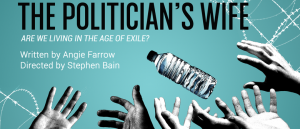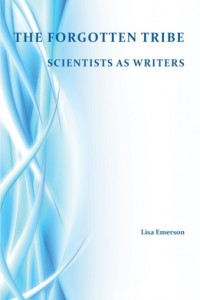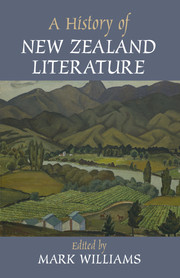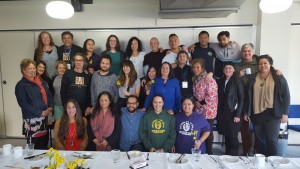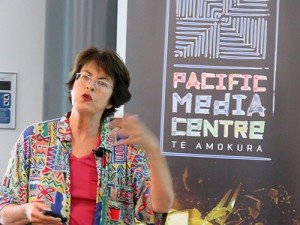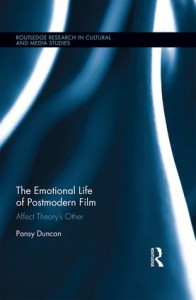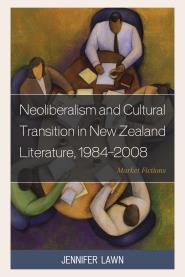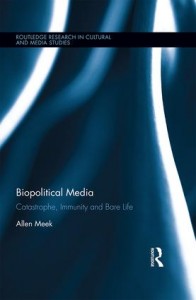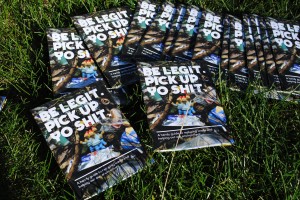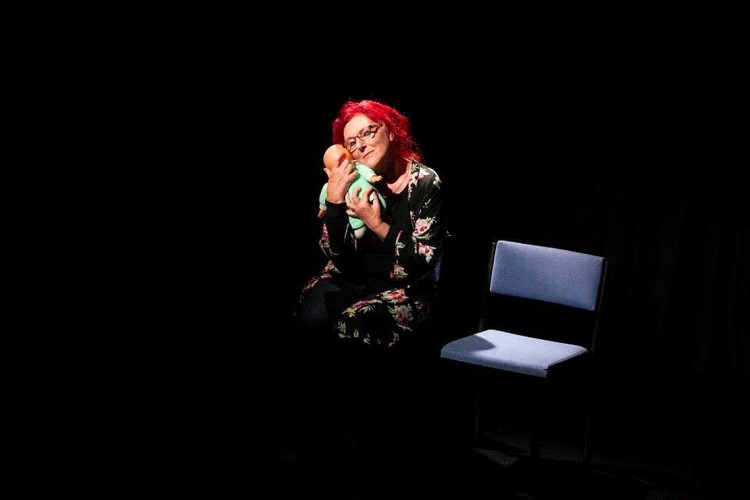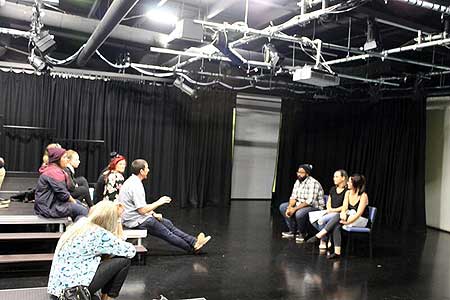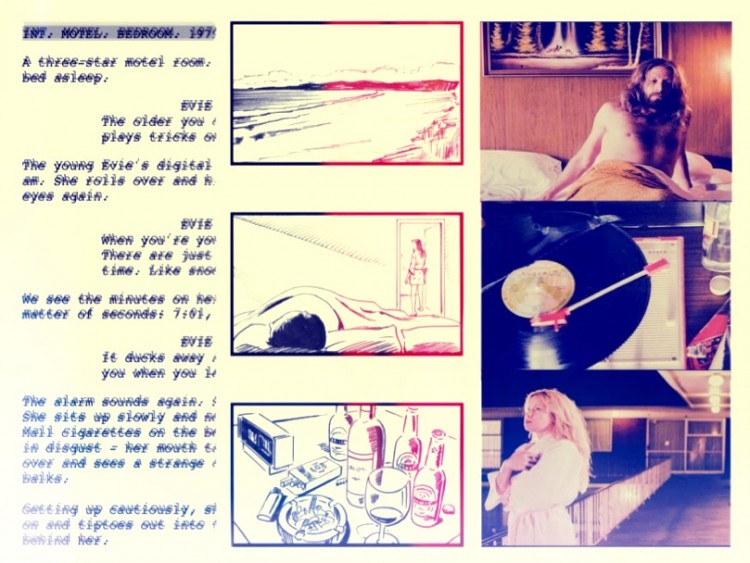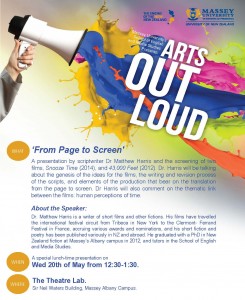Another 2 books, a special issue of a journal, and a play
Dr Thom Conroy had his second novel published: The Salted Air published by Random House Books New Zealand. The Salted Air was ranked in the top ten (2nd, 6th, 9th then 8th) on the Nielsen Weekly Bestsellers List during the month of June peaking at number two for the week ending 4 June.
http://sites.massey.ac.nz/expressivearts/2016/05/04/the-salted-air-a-new-novel-by-thom-conroy/
http://www.radionz.co.nz/national/programmes/standing-room-only/audio/201803396/the-salted-air
Associate Professor Angie Farrow’s full-length play The Politician’s Wife had its debut at Palmerston North’s Centrepoint Theatre mid-June and at Wellington’s BATS Theatre at the end of June. The play was shortlisted for the Adam Prize 2016, the country’s top playwriting award.
Associate Professor Lisa Emerson had a book published online: The forgotten tribe: Scientists as writers, by the WAC clearinghouse and the University Press of Colorado.
http://wac.colostate.edu/books/emerson/
Dr Kim Worthington, Dr Celina Bortolotto, Dr Allan Meek and Dr Jenny Lawn co‐edited an issue of the Australian e‐journal borderlands on the theme, ‘The Limits of Responsibility,’ and co‐wrote the introduction.
Three journal articles from English & Media Studies were included:
Lawn, J., Bortolotto, C., Worthington, K., & Meek, A. (2015). ‘The limits of responsibility’;
Meek, A. (2015). ‘Cultural trauma, biopolitics and the limits of responsibility’; and
Tutor Mr Nick Allen’s honours essay: ‘Memory Shards: A Site of Hope in post‐Apartheid South Africa’.
http://www.borderlands.net.au/issues/vol14no2.html
A number of articles and book chapters appeared by English and Media Studies Staff
Dr David Gruber had an article published: ‘Reinventing the brain, revising neurorhetorics: Phenomenological networks contesting neurobiological interpretations’, in Rhetoric Review 35(3): 239-253.
http://www.tandfonline.com/doi/pdf/10.1080/07350198.2016.1179004
Dr Ingrid Horrocks and Dr Philip Steer had a book chapters published in A History of New Zealand Literature, ed. Mark Williams (Cambridge: Cambridge University Press, 2016).
Horrocks, I. Chapter One: ‘A World of Waters: Imagining, Voyaging, Embarkation.’
Steer, P. Chapter Six: ‘Colonial ecologies: Guthrie-Smith’s Tutira and writing in the settled environment.’
Dr Ingrid Horrocks had an article and accompanying interview published: ‘Something else is going on, an interaction, an exchange: Martin Edmond’s Painted Lives,’ in Biography: An Interdisciplinary Quarterly 38.3 (Summer 2015): 491‐511.
https://uhpjournals.wordpress.com/tag/ingrid-horrocks/
More Creative Outputs and Recognitions
Associate Professor Angie Farrow’s play: ‘The Real Thing’, was performed at the Inspirato International Theatre Festival in Toronto in early June.
Associate Professor Bryan Walpert: had three poems published in the literary journal Ika 4, edited by Anne Kennedy; and gave an invited reading of his work at the Ika launch in Auckland on 14 May.
Associate Professor Bryan Walpert, School of English and Media Studies, was invited to join the Academy of New Zealand Literature.
A new short play addressing climate change by Associate Professor Elspeth Tilley, School of English and Media Studies, called ‘Waiting for Go’, was shortlisted at the Short and Sweet play festivals in both Brisbane and Canberra during June. Each festival receives several hundred entries, with only the top 10% shortlisted.
Staff gave presentations and talks both local and international
Dr Pansy Duncan presented: ‘Exploding the Frame’, at the ‘Popular Culture Association of Australia and New Zealand’ conference, Sydney, Australia, 29 June – 1 July.
Dr David Gruber presented: ‘Suasive Speech: A Stronger Defense of Rhetoric and Futures for Cognitive Poetics’, at the ‘Cognitive Futures in the Humanities’ Conference’, Helsinki, Finland, 13-15 June.
Dr Rand Hazou presented: ‘Presenting the Theatrical Past: Interplays of Artefacts, Discourses and Practices’, at the International Federation of Theatre conference in Stockholm, Sweden, 13-17 June.
Dr Nick Holm presented: ‘Against the Assault of Laughter: Differentiating Critical and Resistant Humour,’ at the Comedy and Critical Thought Conference, 3 and 4 May, University of Kent, UK.
Dr Mary Paul was a panel member on: ‘The Great Kiwi Classic Face‐Off ‐ speaking for New Zealand writer Robin Hyde as the Great Kiwi Classic Author,’ at the Auckland Writers Festival, 14 May.
Dr Erin Mercer presented: ‘Haunting and Spectrality in the Work of Jack Kerouac’, at the ‘Popular Culture Association of Australia and New Zealand’ conference, Sydney, Australia, 29 June – 1 July.
And we hosted a number of research events
Dr Philip Steer organised and hosted an exciting visit by Professor John Plotz, Brandeis University, to the Manawatu campuse. https://www.brandeis.edu/departments/english/faculty/plotz.html
Amongst other events, on Monday 30 May Professor Plotz ran a Masterclass on the topic, “The Anthropocene and Method in the Humanities”.
This was part of a cluster of events on The Anthropocene held in May and June, in collaboration with Massey’s new Political Ecology Research Centre (PERC). Dr Nick Holm and Dr Sy Taffel also gave talks on the topic of the Anthropocene as well as presenting at the College’s ‘Humanities Engagement Series’ focussing on ‘The Land: Resilience and Co-Existence’. These events were run as part of the W. H. Oliver Humanities Research Academy series over the month of June.
Humanities Research Academy: http://www.massey.ac.nz/massey/learning/departments/centres-research/oliver-academy/oliver-academy_home.cfm
Kia Mau Hui: on June 14, the College of Humanities and Social Sciences facilitated and hosted an important international indigenous theatre hui at the Wellington campus, involved Associate Professor Elspeth Tilley. The hui aimed to enable local indigenous artists to connect with indigenous festival directors and staff from Australia and Canada and to develop future collaborations. There were 32 attendees including a number of international indigenous artists. The hui provided an important development opportunity for local theatre artists to pitch to international festival staff.
The School also hosted presentations on various campuses as part of the W.H. Oliver Research Academy Research Series:
You can see the full programme and recordings of some of the seminars here.
